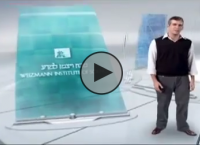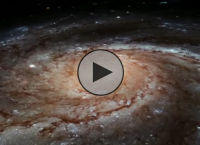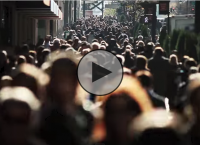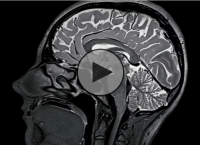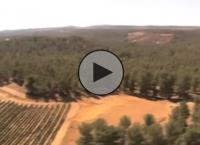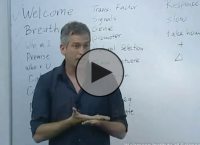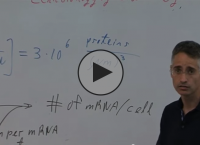Of Mice and Humans
Weizmann Institute research into mouse social behavior finds signs of leadership and reveals “autistic” mouse society
Read full story: http://wis-wander.weizmann.ac.il/mice-in-a-big-brother-setup-develop-social-structures#.VA1Xyfm1bYg
#ויצמן #מכוןויצמן #weizmann #weizmanninstitute #מדע #science #research #מחקר #scientist #scialbehaviour #society #health #medicine #WeizmannInstituteofScience #מכוןויצמןלמדע
Biology of the Blues: Prof. Alon Chen Studies Stress
Prof. Alon Chen of the Department of Neurobiology of the Weizmann Institute of Science explains the mechanism of stress and what happens when the system goes awry.
#ויצמן #מכוןויצמן #weizmann #weizmanninstitute #מדע #science #research #מחקר #scientist #health #medicine #biology #Neurobiology #WeizmannInstituteofScience #מכוןויצמןלמדע
Dendritic Cells Capturing Salmonella Microbes
Dendritic cells (brown) capture Salmonella microbes (light blue), then rapidly retract their extensions (arrow)
From the article The Spies Inside:
To detect harmful bacteria, the immune system sends its "spies," so-called dendritic cells, to the surface of the gut lining.
http://wis-wander.weizmann.ac.il/the-spies-inside#.UYtNALVHLXJ
תאים דנדריטים (חום) לוכדים את חיידקי הסלמונלה (כחול בהיר), ומיד כונסים את השלוחות שלהם לעבר גוף התא (חץ)
(c) Weizmann Institute of Science
#ויצמן #מכוןויצמן #weizmann #weizmanninstitute #מדע #science #research #מחקר #scientist #microbes #salmonella #microbes #סלמונלה #חיידקים #WeizmannInstituteofScience #מכוןויצמןלמדע
Dendritic Cells
Dendritic cells send their extensions (red arrows) between adjacent epithelial cells (blue) in the lining of the small intestine
From the article The Spies Inside:
To detect harmful bacteria, the immune system sends its "spies," so-called dendritic cells, to the surface of the gut lining.
http://wis-wander.weizmann.ac.il/the-spies-inside#.UYtNALVHLXJ
תאים דנדריטיים שולחים את השלוחות שלהם (חצים אדומים) בין תאי אפיתל סמוכים (כחול), המדפנים את פני השטח של המעי הדק
(c) Weizmann Institute of Science
#ויצמן #מכוןויצמן #weizmann #weizmanninstitute #מדע #science #research #מחקר #scientist #cells #dendritic
The Deep Blue
Dr. Assaf Vardi and his Weizmann team joined a month-long research cruise to study the life cycle of a tiny microorganism.
http://wis-wander.weizmann.ac.il/the-deep-blue#.UbBIiUBHLXI
#ויצמן #מכוןויצמן #weizmann #weizmanninstitute #מדע #science #research #מחקר #scientist #deepblue #microorganism #WeizmannInstituteofScience #מכוןויצמןלמדע
Ice Bucket Challenge, Fainzilber, Chen and Peles
#ויצמן #מכוןויצמן #weizmann #weizmanninstitute #מדע #science #research #מחקר #scientist #icebucketchallenge #socialscience #social #WeizmannInstituteofScience #מכוןויצמןלמדע
Ice Bucket Challenge, Dr. Eran Hornstein
#אתגר_דלי_הקרח
#icebucketchallenge
*Click "See More" for English*
כשד"ר ערן הורנשטיין, חוקר במחלקה לגנטיקה מולקולרית במכון ויצמן למדע שבין תחומי מחקרו גם חקר מחלת ה-ALS מבצע את #אתגר_דלי_הקרח, אתם יכולים להיות בטוחים שיהיה לזה טוויסט מדעי.
ד"ר הורנשטיין איתגר שלושה חוקרים נוספים ממכון ויצמן למדע, שעוסקים בתחומי חקר מחלת ה-ALS :
פרופ' מיכאל פיינזילבר מהמחלקה לכימיה ביולוגית, פרופ' אלון חן מהמחלקה לנוירוביולוגיה, ופרופ' אליאור פלס מהמחלקה לביולוגיה מולקולרית של התא.
מלבד האתגר, תורם ערן 100$ לחקר המחלה. אנחנו מזמינים גם אתכם לתרום בכתובת israls.org.il .
האם שלושת החוקרים יעמדו באתגר? מבטיחים לעדכן.
When Dr. Eran Hornstein, a researcher in the Weizmann Institute’s Molecular Genetics Department who, among other things, investigates the molecular basis of ALS, takes up the ice bucket challenge, you can be sure there will be a scientific twist. Hornstein challenged another three Institute scientists, each of whom conducts research that is connected to ALS – Profs. Michael Fainzilber of the Biological Chemistry Department, Alon Chen of the Neurobiology Department and Elior Peles of the Molecular Cell Biology Department.
Hornstein, even though he accepted the challenge, donated $100 to the ALS research. You can follow his lead and donate: israls.org.il.
Will the other three scientists do the same? Keep posted.
#ויצמן #מכוןויצמן #weizmann #weizmanninstitute #מדע #science #research #מחקר #scientist #icebucketchallenge #socialscience #social #WeizmannInstituteofScience #מכוןויצמןלמדע
Bright-field Light Microscopy Images of Plant Cell Walls
Bright-field light microscopy images of plant cell walls, stripped of lignin, degraded by cellulosomes
Observing the breakdown of the tough material in plant cell walls may lead to better biofuel production
Read full article: http://wis-wander.weizmann.ac.il/bringing-down-walls#.UW-LTrVHLXI
#ויצמן #מכוןויצמן #weizmann #weizmanninstitute #מדע #science #research #מחקר #scientist #microscopy #plantcells #plantcell
How Does One Protein Direct Two Different Life-or-Death Activities in the Cell?
Institute scientists studying a specific protein are finding that it can split its activities between two different sites in the cell, and its different actions in each can literally be a matter of life or death. Their findings may be important for understanding a number of disorders, from a rare genetic disease to such metabolic syndromes as obesity and diabetes.
#ויצמן #מכוןויצמן #weizmann #weizmanninstitute #מדע #science #research #מחקר #scientist #protein #cells #obesity #diabetes #WeizmannInstituteofScience #מכוןויצמןלמדע
Locally Produced Proteins
How do long nerve extensions get a crucial molecule to an injury site in time? Weizmann Institute findings may help point the way toward better treatments for nerve damage and aid in finding ways to speed up the repair.
http://wis-wander.weizmann.ac.il/locally-produced-proteins#.UbBPoEBHLXI
#ויצמן #מכוןויצמן #weizmann #weizmanninstitute #מדע #science #research #מחקר #scientist #protein #molecule #nervedamage #WeizmannInstituteofScience #מכוןויצמןלמדע
Complexity and the Single Cell
No matter how complex, all organisms -- from the tiniest fruit fly to a human being -- begin with a single cell. We know that this cell contains all the instructions for making every cell type in the body. The challenge is to uncover the overall plan laid out in the instruction book -- the genome. What makes a head at one end and a tail at the other, a front and back, and, continuing through embryonic development, all the complex and diverse patterns that make up the living creature?
http://wis-wander.weizmann.ac.il/complexity-and-the-single-cell#.UbBRUUBHLXI
#ויצמן #מכוןויצמן #weizmann #weizmanninstitute #מדע #science #research #מחקר #scientist #genome #WeizmannInstituteofScience #מכוןויצמןלמדע
Taking Stock of Calcium
SARAF tagged with green fluorescent protein. The fluorescent signals get stronger as SARAF moves closer to the plasma membrane. Read full article: http://wis-wander.weizmann.ac.il/taking-stock-of-calcium
#ויצמן #מכוןויצמן #weizmann #weizmanninstitute #מדע #science #research #מחקר #scientist #calcium #plasma
Protein Interaction in a Cell
Lower left - light microscopy image shows the time from the injection of the second protein. Upper left - donor proteins appear in green. Upper right - as the proteins interact, energy is transferred to the acceptor proteins, causing them to glow red. Lower right - donor and acceptor dynamics combined. See accompanying article http://wis-wander.weizmann.ac.il/meetings-in-the-cell
#ויצמן #מכוןויצמן #weizmann #weizmanninstitute #מדע #science #research #מחקר #scientist #protein #livingcell #livingcells #energy #WeizmannInstituteofScience #מכוןויצמןלמדע
Effector Cells in an Experimental Control Move on Endothelium That Does Not Produce Internal Chemoki
The white blood cells that fight disease and help our bodies heal are directed to sites of infection or injury by 'exit signs' - chemical signals that tell them where to pass through the blood vessel walls and into the underlying tissue. New research at the Weizmann Institute, which appeared in Nature Immunology online, shows how the cells lining blood vessel walls may act as 'selectors' by hiding the signals where only certain 'educated' white blood cells will find them.
Read Full article: http://wis-wander.weizmann.ac.il/hide-and-seek-signals
#ויצמן #מכוןויצמן #weizmann #weizmanninstitute #מדע #science #research #מחקר #scientist #whiteblood #livingcells #cells #Immunology #nature
Effector Cells, Tagged Green, Seem to Fade as They Detect Chemokines and Move Inward, Past the Surfa
The white blood cells that fight disease and help our bodies heal are directed to sites of infection or injury by 'exit signs' - chemical signals that tell them where to pass through the blood vessel walls and into the underlying tissue. New research at the Weizmann Institute, which appeared in Nature Immunology online, shows how the cells lining blood vessel walls may act as 'selectors' by hiding the signals where only certain 'educated' white blood cells will find them.
Read Full article: http://wis-wander.weizmann.ac.il/hide-and-seek-signals
#ויצמן #מכוןויצמן #weizmann #weizmanninstitute #מדע #science #research #מחקר #scientist #cells #livingcells #whitebloodcells #chemistry #chemical
Neural Crest Cell Migration in a Chicken Embryo
A gene that protects us from cancer is also involved in the timing of a crucial stage of embryonic development. Full article: http://wis-wander.weizmann.ac.il/new-job-for-a-busy-protein#.UcBJVflHLXI
#ויצמן #מכוןויצמן #weizmann #weizmanninstitute #מדע #science #research #מחקר #scientist #genes #genome #WeizmannInstituteofScience #מכוןויצמןלמדע
Congestion Control, Prof. Yitzhak Pilpel and Dr. Tamir Tuller
Protein production is among one of the most demanding biological processes regulated by living cells, which consumes a valuable amount of time, energy and resources.Weizmann Institute scientists have found that a biological "ramp meter" design - conserved among a whole spectrum of species -- ; is an optimal strategy for cells to save energy and reduce costs during protein production
#ויצמן #מכוןויצמן #weizmann #weizmanninstitute #מדע #science #research #מחקר #scientist #protein #livingcells #biology #WeizmannInstituteofScience #מכוןויצמןלמדע
What is the Snail's Secret of Regeneration
Find out with Prof. Michael Fainzilber of the Weizmann Institute of Science
#ויצמן #מכוןויצמן #weizmann #weizmanninstitute #מדע #science #research #מחקר #scientist #regeneration #WeizmannInstituteofScience #מכוןויצמןלמדע
Going with the Flow
Prof. Ronen Alon of the Weizmann Institute gains insight into how immune cells squeeze their way through the blood vessel wall on their way to fighting infection.
#ויצמן #מכוןויצמן #weizmann #weizmanninstitute #מדע #science #research #מחקר #scientist #immunecells #immunesystem #lifescience #WeizmannInstituteofScience #מכוןויצמןלמדע
Self Defense - The Maize Case
Corn yields on experimental plots in Kenya have tripled, thanks to a new weed-fighting strategy developed by Weizmann Institute's Prof. Jonathan Gressel
#ויצמן #מכוןויצמן #weizmann #weizmanninstitute #מדע #science #research #מחקר #scientist #WeizmannInstituteofScience #מכוןויצמןלמדע
A Gift From Mother Nature
A pioneering research project of Weizmann Institute Profs. Meir Wilchek and Ed Bayer has shown the potential of a powerful and unexplained affinity between two molecular substances, avidin and biotin, which can be put to practical use for medical, research and industrial purposes.
#ויצמן #מכוןויצמן #weizmann #weizmanninstitute #מדע #science #research #מחקר #scientist #immunesystem #Transplantation #health #medicine #lifescience #WeizmannInstituteofScience #מכוןויצמןלמדע
A Trillion Computers
A group of scientists headed by Prof. Ehud Shapiro at the Weizmann Institute of Science has used biological molecules to create a tiny computer - a programmable two-state, two-symbol finite automaton - in a test tube. This biological nanocomputer is so small that a trillion (1,000,000,000,000) such computers co-exist and compute in parallel, in a drop the size of 1/10 of a milliliter of watery solution held at room temperature. Collectively, the computers perform a billion operations per second with greater than 99.8% accuracy per operation while requiring less than a billionth of a Watt of power. This study may lead to future computers that can operate within the human body, interacting with its biochemical environment to yield far-reaching biological and pharmaceutical applications.
#ויצמן #מכוןויצמן #weizmann #weizmanninstitute #מדע #science #research #מחקר #scientist #immunesystem #health #medicine #lifescience #biology #computer #WeizmannInstituteofScience #מכוןויצמןלמדע
Beginner's Luck
A brief introduction into embryonic stem cells - what they are and what they can be used for. Weizmann Institute scientists are able to conduct cutting-edge research on stem cells thanks to the Helen and Martin Kimmel Institute for Stem Cell Research.
Copyright © Weizmann Institute of Science
#ויצמן #מכוןויצמן #weizmann #weizmanninstitute #מדע #science #research #מחקר #scientist #stemcells #WeizmannInstituteofScience #מכוןויצמןלמדע
Bone Marrow Transplantation
One of the very first "Bubble Children" born without an immune system to benefit from a bone marrow transplant technique developed at the Weizmann Institute of Science.
#ויצמן #מכוןויצמן #weizmann #weizmanninstitute #מדע #science #research #מחקר #scientist #immunesystem #Transplantation #health #medicine #lifescience #WeizmannInstituteofScience #מכוןויצמןלמדע
Amoeba Buddy System
Weizmann Institute Profs. David Mirelman and Elisha Moses join forces in discovering the mechanics and physics of cell division on a molecular level using amoeba cells.
#ויצמן #מכוןויצמן #weizmann #weizmanninstitute #מדע #science #research #מחקר #scientist #amoeba #celldivision #molecule #lifescience #WeizmannInstituteofScience #מכוןויצמןלמדע
Complexity and the Single Cell
No matter how complex, all organisms -- from the tiniest fruit fly to a human being -- begin with a single cell. We know that this cell contains all the instructions for making every cell type in the body. The challenge is to uncover the overall plan laid out in the instruction book -- the genome. What makes a head at one end and a tail at the other, a front and back, and, continuing through embryonic development, all the complex and diverse patterns that make up the living creature?
http://wis-wander.weizmann.ac.il/complexity-and-the-single-cell#.UbBRUUBHLXI
#ויצמן #מכוןויצמן #weizmann #weizmanninstitute #מדע #science #research #מחקר #scientist #genome #WeizmannInstituteofScience #מכוןויצמןלמדע
Development of the Lymphatic Vascular System in Zebrafish
This movie shows two-photon time-lapse images of transgenic zebrafish expressing GFP in the nuclei of endothelial cells. Two lymphatic endothelial progenitors and their daughters have been highlighted in yellow and red for ease of tracking. Endothelial nuclei in the midline of the embryo migrate rostrally and then ventrally. Just ventral to the dorsal aorta they divide and the daughter cells incorporate into the wall of the newly formed thoracic duct - the main lymphatic vessel of the fish.
http://wis-wander.weizmann.ac.il/fat-chance-for-health#.UlUztVCnrux
#ויצמן #מכוןויצמן #weizmann #weizmanninstitute #מדע #science #research #מחקר #scientist #WeizmannInstituteofScience #מכוןויצמןלמדע
Zebrafish Vessel Formation in vivo
This movie shows timelapse multiphoton confocal images of vessel dynamics in fli-EGFP transgenic zebrafish. Elongating angiogenic sprouts migrate between the somites to give rise to a dorsal branch. Highly dynamic behavior involving extension and retraction of numerous filopodia can be seen as the sprouts extend dorsally.
http://wis-wander.weizmann.ac.il/fat-chance-for-health#.UlUns1Cnruw
#ויצמן #מכוןויצמן #weizmann #weizmanninstitute #מדע #science #research #מחקר #scientist #WeizmannInstituteofScience #מכוןויצמןלמדע
Induced pluripotent stem cell (iPSC) formation
Live video comparison of traditional (left) vs deterministic (right) iPSC formation. Only in deterministic reprogramming, 100% (all) donor somatic cells (labeled in red) turn on GFP pluripotency (iPSC) marker (100% of cells become yellow)
Read more: http://wis-wander.weizmann.ac.il/stem-cell-reprogramming-made-easier?press-room-rb#.UjWW_8ZHLXI
מדעני מכון ויצמן למדע פיתחו שיטה פורצת דרך להגברת יעילות הייצור של תאי גזע
מעקב אחר תהליך התיכנות מחדש במשך שישה ימים. תאי העור הבוגרים (מסומנים באדום) אשר עוברים "תיכנות מחדש" בשיטה שפיתח ד"ר חנא (מימין), הופכים כולם לתאי גזע מושרים המבטאים סמן פלואוסצנטי ירוק, ואילו רק תאים בודדים מאלה ש"מתוכנתים מחדש" בשיטה המסורתית (משמאל) הופכים לתאי גזע
קראו עוד:
http://ow.ly/oNUF9
#ויצמן #מכוןויצמן #weizmann #weizmanninstitute #מדע #science #research #מחקר #scientist #stemcells #תאיגזע #WeizmannInstituteofScience #מכוןויצמןלמדע
Drifting Sands
Presents a unique educational program dreamed up by Weizmann Institute researchers to help children form roots and excel in a new land by learning about the ecology, geology and origins of sand dunes of near new their home town.
#ויצמן #מכוןויצמן #weizmann #weizmanninstitute #מדע #science #research #מחקר #scientist #ecology #geology #WeizmannInstituteofScience #מכוןויצמןלמדע
New Stem Cells Go Back Further
A team at the Weizmann Institute has created iPS cells that are completely "reset" to the earliest possible state and maintained them in that state.
In the video: Human naive iPS-derived cells (yellow/green) integrating into different tissues of a developing host mouse embryo (red cells).
For full story: http://wis-wander.weizmann.ac.il/new-stem-cells-go-back-further#.Umy6T_mnrux
מדעני מכון ויצמן למדע יצרו לראשונה תאי גזע אנושיים "ניטרליים" לחלוטין, שהתפתחו לרקמות בתוך עובר
עכבר
ההישג עשוי, בין היתר, לסלול את הדרך לייצור איברים להשתלה
http://ow.ly/qsKWP קראו עוד:
סרטון המציג את השתלבותם של תאי גזע מושרים אנושיים נייטראליים, שיוצרו בשיטתו של ד"ר חנא (בירוק וצהוב) ברקמות של עובר עכבר (באדום)
#ויצמן #מכוןויצמן #weizmann #weizmanninstitute #מדע #science #research #מחקר #scientist #תאיגזע #stemcells #health #medicine
Where Have all the Paternal Mitochondria Gone?
It's common high school knowledge that all organisms inherit their mitochondria -- the cellular "power plants" -- from their mothers. But what happens to all the father's mitochondria?
Now, Dr. Eli Arama and team of the Weizmann Institute's Molecular Genetics Department have discovered special cellular vesicles originating in the female fruit flies' egg, which actively seek out and destroy the father's mitochondria upon fertilization.
Read article for further details: http://wis-wander.weizmann.ac.il/where-have-all-the-mitochondria-gone?press-room-rb#.U3S0hvmSx8E
#ויצמן #מכוןויצמן #weizmann #weizmanninstitute #מדע #science #research #מחקר #scientist #Mitochondria #cells #molecule #WeizmannInstituteofScience #מכוןויצמןלמדע
Coral Cilia
Appears in article: http://wis-wander.weizmann.ac.il/the-coral-sweepstakes
Cilia covering the surface of reef-building corals beat synchronously to drive rapid vortical flows (150x magnification). Credit: Orr Shapiro, Assaf Vardi, Weizmann Institute of Science, Israel; Vicente Fernandez, Roman Stocker, Massachusetts Institute of Technology, USA.
Source: Vortical ciliary flows actively enhance mass transport in reef corals.Orr H. Shapiro, Vicente I. Fernandez, Melissa S. Garren, Jeffrey S. Guasto, François P. Debaillon-Vesque, Esti Kramarski-Winter, Assaf Vardi, Roman Stocker. Proceedings of the National Academy of Sciences (PNAS) (2014) 111(37): 13391–13396 (DOI number 10.1073/pnas.1323094111).
http://www.pnas.org/content/111/37/13391.full?sid=459c1385-0fb7-4b22-a515-94864d8de1f7
#ויצמן #מכוןויצמן #weizmann #weizmanninstitute #מדע #science #research #מחקר #scientist #WeizmannInstituteofScience #מכוןויצמןלמדע
Coral Ciliary Flows
Appears in article: http://wis-wander.weizmann.ac.il/the-coral-sweepstakes
The motion of tracer particles (1 micrometer in diameter, imaged by dark field microscopy; 4x magnification) reveals the rapid vortical flows driven by cilia covering the surface of a reef-building coral. By actively mixing their boundary layer, corals enhance the exchange of oxygen and nutrients with the environment. Credit: Orr Shapiro, Assaf Vardi, Weizmann Institute of Science, Israel; Vicente Fernandez, Roman Stocker, Massachusetts Institute of Technology, USA.
Source: Vortical ciliary flows actively enhance mass transport in reef corals.Orr H. Shapiro, Vicente I. Fernandez, Melissa S. Garren, Jeffrey S. Guasto, François P. Debaillon-Vesque, Esti Kramarski-Winter, Assaf Vardi, Roman Stocker. Proceedings of the National Academy of Sciences (PNAS) (2014) 111(37): 13391–13396 (DOI number 10.1073/pnas.1323094111).
http://www.pnas.org/content/111/37/13391.full?sid=459c1385-0fb7-4b22-a515-94864d8de1f7
#ויצמן #מכוןויצמן #weizmann #weizmanninstitute #מדע #science #research #מחקר #scientist #particles #WeizmannInstituteofScience #מכוןויצמןלמדע
How a Breast Cancer Cell Moves
The discovery of a new breast cancer gene holds hope for treatment:
A breast cancer cell forms invasive extensions called podia that enable it to move. An indispensable step, which precedes the formation of the podia by several seconds, is the accumulation of proteins encoded by the SYNJ2 gene (bright-green dots).
To read full article: http://wis-wander.weizmann.ac.il/life-sciences/victory-numbers
#ויצמן #מכוןויצמן #weizmann #weizmanninstitute #מדע #science #research #מחקר #scientist #breastcancer #treatment #health #medicine
Cytoplasmic Bridge Connecting Senescent Cell and NK Cell
When our cells get old or worn out from too much stress they may enter a state known as senescence – they stop dividing, completely and permanently. Senescent cells may be elderly, but they can still make themselves heard. Recent research in the lab of Dr. Valery Krizhanovsky of the Weizmann Institute’s Molecular Cell Biology Department reveals that these cells have a special way of communicating, in which they build bridges enabling some cells to pass on urgent messages. The group’s findings recently appeared in Genes & Development. Among other things, this mode of sharing may help clear unwanted senescent cells from the body. Click on link for full story: http://wis-wander.weizmann.ac.il/cells-that-share-everything
#ויצמן #מכוןויצמן #weizmann #weizmanninstitute #מדע #science #research #מחקר #scientist #cells #genes #health #medicine
Time-Lapse Video of a Cytoskeleton Self-Assembling Over Some 12 Hours
The fibers swirl counter-clockwise, ultimately creating a helical structure.
A new study headed by Prof. Alexander Bershadsky of the Weizmann Institute of Science has revealed that cells can “tell” left from right. Click on link for article: http://bit.ly/1zSadUj
#ויצמן #מכוןויצמן #weizmann #weizmanninstitute #מדע #science #research #מחקר #scientist #fiber #lifescience
Cellular Reshaping
When the cell -- viewed under a fluorescent microscope -- contains the hybrid version of the Arp2/3 complex (right), its adhesion sites (bright dots) grow and change in shape, compared with the cell that contains the classic, seven-unit version of Arp2/3 (left).
Read accompanying article for more information:
http://wis-wander.weizmann.ac.il/when-the-reshaping-tool-reshapes-itself#.U3ntqvmSx8F
#ויצמן #מכוןויצמן #weizmann #weizmanninstitute #מדע #science #research #מחקר #scientist #cells #microscope #WeizmannInstituteofScience #מכוןויצמןלמדע


